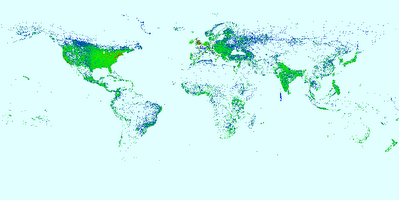Posted by Jens Redmer, Head of Google Book Search Europe, Middle East, and AfricaI love books. We Germans love books. And we read them enthusiastically. Germans are not only known to be among the most intense sauerkraut (legend) and beer (fact) consumers worldwide, but even more so among the most avid book consumers — and book creators.
My fellow German national Johannes Gensfleisch, much better known as Gutenberg, created a machine that changed the way mankind gained access to information forever. We all know the incredibly positive impact his press had on the development and dissemination of culture. In our era, digitisation can substantially improve access to information in a similar fashion. Today, everyone with internet access — regardless of age or location — can discover information on their specific subject of interest, in almost any language, with only a few strokes on a keyboard. I find that absolutely fantastic.
Europe is one of the most culturally and linguistically diverse regions of the world. This multilinguality fascinates and drives us at Google — reason enough for us to adapt and operate our products in far more than 100 languages. Did you know you can even search on Google in Romantsch, a language little known outside of Switzerland?
That is why today, I am truly excited and pleased to announce a significant step towards enriching our multilingual index: we are adding our largest non-English library to the Google Books Library Project, thanks to a new partnership with the
Bayerische Staatsbibliothek (Bavarian State Library). Book lovers around the world will soon be able to access the library's public domain works online through Google Book Search, tracing the rich history of German literature through the centuries.
As one of Europe's most important and renowned international research libraries, Bayerische Staatsbibliothek will add more than a million out-of-copyright books to the program, from well-loved German classics by the Brothers Grimm and Goethe to extensive collections previously only available to those able to consult the library's stacks. In addition to German-language works, the library's collection includes numerous out-of-copyright works in French, Spanish, Latin, Italian and English. Some of the works of the Bayerische Staatsbibliothek date back to the very first moments of book printing and bear incredible cultural meaning.
I grew up in the very north of Germany, and I used to fall asleep as a child hearing my parents reading a tale from the Brothers Grimm, such as Rotkäppchen (Little Red Riding Hood) or Dornröschen (Sleeping Beauty), so I know and adore these true classics only too well, much like every child in Germany, and it is very exiting to know that early editions will now come online.
I am not only thrilled about this partnership as a German, but even more so as a European. Helping to make the diverse European culture discoverable and accessible to a worldwide audience is one of the most fascinating jobs one can ever imagine. Servus und herzlich willkommen, Bayerische Staatsbibliothek.





